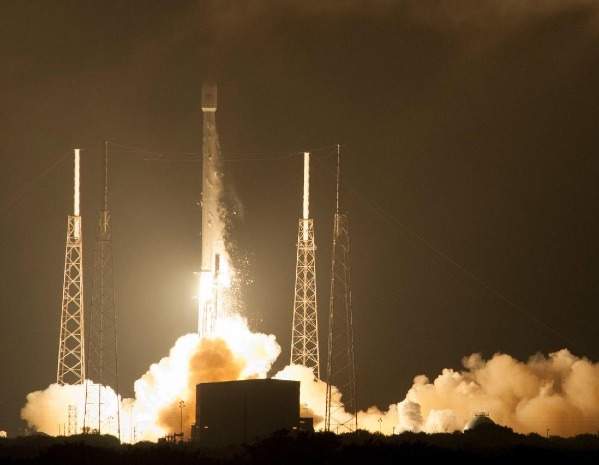
A Falcon 9 v1.1 rocket lifts off from Cape Canaveral, Florida, on August 5, carrying the AsiaSat 8 satellite. Another Falcon 9 launch of an AsiaSat satellite, planned for after midnight on Wednesday, has been postponed by one to two weeks. (credit: SpaceX)
SpaceX has postponed a Falcon 9 launch of an AsiaSat communications satellite that was scheduled for just after midnight Wednesday in order to “review all potential failure modes and contingencies again” but adding there is no specific issue with the rocket nor a link to last Friday’s loss of an experimental vehicle in a test flight.
In a statement issued around 10 pm Eastern time Tuesday evening by SpaceX, company CEO Elon Musk said the launch of AsiaSat 6 would be delayed by one to two weeks in order to “triple-check” potential issues that could cause problems. “We are not aware of any issue with Falcon 9, nor the interfaces with the spacecraft, but have decided to review all potential failure modes and contingencies again,” Musk said in the statement.
The statement came more than six hours after SpaceX postponed the launch, offering no reasons for the postponement. A statement issued Tuesday evening by AsiaSat said that the launch “has been postponed until further notice to allow more time for SpaceX to examine and verify data,” but provided no additional details. The Falcon 9 rocket had already been placed on the pad when the launch postponement was announced Tuesday afternoon.
Musk said in Tuesday night’s statement that the postponement was not linked directly to Friday’s loss of the F9R-Dev experimental vehicle in a flight at the company’s test site near McGregor, Texas. “After a thorough review, we are confident that there is no direct link,” Musk said. “Had the same blocked sensor port problem occurred with an operational Falcon 9, it would have been outvoted by several other sensors. That voting system was not present on the test vehicle.” The reference to a “blocked sensor port” is the first detail the company has provided regarding the loss of the F9R-Dev vehicle Friday.
“What we do want to triple-check is whether even highly improbable corner case scenarios have the optimal fault detection and recovery logic,” Musk said, adding that “the most likely outcome is no change.”
A delay of one to two weeks would have ripple effects not only on SpaceX’s launch schedule, but for other organizations, including NASA. SpaceX’s next launch after AsiaSat 6 is a commercial cargo mission for NASA tentatively scheduled for September 19 before today’s postponement. A delay in that launch could also delay the next Orbital cargo mission, slated for launch in mid-October from the Mid-Atlantic Regional Spaceport in Virginia.
SpaceX, which at the beginning of the year had plans to launch ten Falcon 9 rockets in 2014, has so far launched only four. At the AIAA Space 2014 conference in San Diego earlier this month, immediately after the Falcon 9 launch of AsiaSat 8, SpaceX’s Lauren Dreyer said the company had plans to do five more launches this year. That is still possible, although SpaceX will have to maintain a tempo of one launch every three to four weeks for the remainder of the year to meet that goal.

Leave a Reply